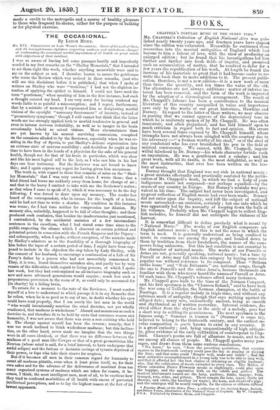No. XVI. ConsEcriors or LAST WFXS'S OCCASIONAL. Cause of its
need of them, and its incompleteness—Opinions respecting madness and wickedness—Danger of confounding the occasional morbid impressions of ill health on great minds with subjection., of their intellect.
I Nv.ts so aware of having left some passages hastily and imperfectly worded in my first remarks on the "Shelley Memorials," that I intended to set them right this week, whether anything meanwhile were said to me on the subject or not. I therefore hasten to assure the gentleman who wrote the Review which was noticed in those remarks, (and who will see this disclaimer before it is published,) that when I spoke of writers on Shelley who were "truthless," I had not the slightest in- tention of applying the epithet to himself. I could not have used the term "gentleman," when speaking of him in the first instance, had such a thought entered my head. I am very sorry for having rendered my words liable to so painful a misconception; and I regret, furthermore, that by a mistake of memory I represented him as designating morbid visions of the eyesight "necessary forerunners" of insanity, instead of "premonitory symptoms," though I still cannot but think that the latter words are too strongly applied both to morbid tendencies in general and even to intense nervous irritability, as well as to images in the brain occasionally beheld as actual visions. More circumstances than are yet known by his nearest surviving connexions, conspired on the occasions alluded to by the Reviewer, especially when he was re- siding in the Bay of Spezia, to put Shelley's delicate organization into an extreme state of nervous sensibility ; and doubtless he ought at that time to have been in the hands of a physician for the sake of his general health, though not for that of his brain in particular, which was clear and like his most logical self to the last, as I who saw him in his last days can bear testimony. But the Reviewer was not bound to know this; and I again express my regret for having given hint uneasiness.
The truth is, with regard to those first remarks of mine on the "Shel- ley Memorials," that I was very unwell when I wrote them; that a kind friend had borne me suddenly away from home, for change of air ; and that in the hurry I omitted to take with me the Reviewer's notice ; so that when I came to speak of it, which it was necessary to do the day following, I was forced to draw upon my memory. The reader has heard of the correspondent, who in excuse for the length of a letter, said he had not time to write a shorter. My condition in this instance was worse ; for I had time neither for compression nor dilation. My memory also, unluckily, happened to he full of other thoughts; and these produced such confusion, that besides the inadvertencies just mentioned, I contradicted, by the accidental omission of a few intermediate sentences in the exordium, what I had stated some time since to the public respecting the silence which I observed on certain political and polemical points in connexion with the French Emperor and the Papacy : and subsequently, when I spoke, without exception, of the mistake made by Shelley's admirers as to the feasibility of a thorough biography of him before the lapse of a certain period of time, I might have been sup-. posed to include in the objection the step taken by Lady Shelley, with the consent of her husband, to encourage a continuation of a Life of Sir Percy's father by a person who had not unworthily commenced it. They, it is true, found themselves mistaken also, and partly too by very reason of the difficulties with regard to living persons, of which I spoke last week, but they had contemplated no all-inclusive biography such as new and more advanced generations would require ; much less such a preposterous pretension in the room of it, as could only be accounted for (in charity) by a failing brain.
To return for a moment to the note of the Reviewer, I must confess myself at a loss to understand to which passage it is in my Remarks that he refers, when he is so good as to say of me, in doubt whether his eyes could have read properly, that I am surely the last man in the world "who would intentionally sanction the cruel doctrine, not yet wholly eradicated, that madness is wickedness." Absurd and monstrous as such a doctrine is, and therefore fit to be held by sects that renounce reason and humanity, I was not aware that there was even a sect existing who held it. The charge against myself has been the reverse ; namely, that I was too much inclined to think wickedness madness ; but this inclina- tion, on the other hand, never made me imagine that the two things were in all cases identical, or that there was no difference between the madness of a good man like Cowper or that of a great geometrician like Newton (whose mind is said, for a brief interval, to have undergone that awful eclipse) and the furious or fantastic ravings of tyrants deprived of their power, or fops who take their straws for sceptres.
But if it becomes all men in their common regard for humanity to count all madness pitiable, even when it least pities itself, so, for their own sakes and for the advance of the deliverance of mankind from too many organized systems of madness which are taken for reason, it be- comes, I think, the most intelligent men, most of all, to be cautious how they tend to confound morbidities of ill health with omens of perverted intellectual perceptions, and so to lay the highest reason at the feet of its lowest opponents.


























 Previous page
Previous page